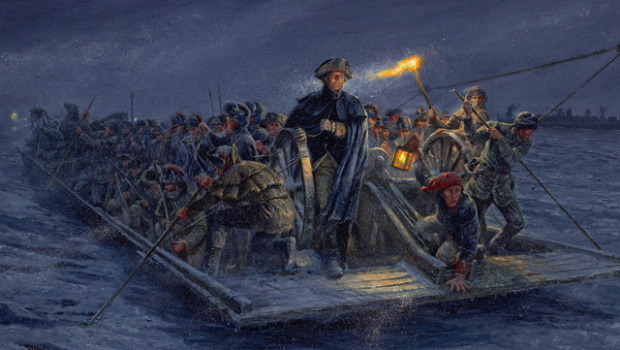
On the frigid night of December 25, 1776, General George Washington faced one of the most pivotal moments in the fight for American independence. The Continental Army, battered by months of retreat and defeat, teetered on the brink of collapse. Enlistments were expiring. Supplies were dwindling. Morale was shattered. If the cause of liberty was to survive, it required an audacious act of courage.
Washington’s plan was bold to the point of desperation. Armed with the password "Victory or Death," he would lead his troops across the icy Delaware River in the dead of night to launch a surprise attack on the Hessian garrison at Trenton, New Jersey. The stakes couldn’t have been higher: failure would almost certainly spell the end of the Revolution. But Washington, embodying the spirit of divine providence and unwavering resolve, pressed forward.
The Challenges
The Delaware River, swollen with winter rains, was treacherous. Sheets of ice floated atop its black waters, and the howling wind tore through the soldiers’ threadbare clothing. Washington’s army, a ragtag group of citizen-soldiers and patriots, endured hardships that tested their limits. They lacked proper shoes, leaving bloody footprints in the snow. Hunger gnawed at their stomachs, and many had grown sick from exposure.
Timing was critical. Washington needed his men to cross the river and march nine miles to Trenton before dawn. But the river crossing was perilously slow. The Durham boats creaked under the weight of soldiers, horses, and cannons. Ice jams delayed progress. Commanders like Colonel John Glover, whose seafaring New England troops manned the boats, worked tirelessly to keep the operation from collapsing under the strain.
The Enemy
At Trenton, the Hessians—German mercenaries hired by the British—had grown complacent. Their commander, Colonel Johann Rall, received multiple warnings of potential American movements but dismissed them as implausible. One such warning, a letter, lay unopened in his pocket as he celebrated Christmas with his officers.
The Hessians believed Washington’s army was broken, incapable of mounting any serious threat. This misjudgment would prove fatal.
The Battle
By the time Washington’s forces reached Trenton, dawn was breaking. Though the element of surprise had been partially compromised, the Continental Army pressed the attack. Fighting through the streets, they overwhelmed the stunned Hessians in a swift and decisive victory.
Remarkably, the Americans suffered only a handful of casualties. The Hessians, caught completely off guard, surrendered en masse. Washington’s gamble had paid off.
Providence and the Cause of Liberty
Many, including Washington himself, saw the hand of divine providence in the victory. Against overwhelming odds, the American cause was revived. The victory at Trenton boosted morale and reinvigorated the fight for independence. It sent a message to the world: the pursuit of liberty, rooted in God-given rights, was worth any risk.
Echoes to Today
The spirit of 1776 reminds us that freedom is never guaranteed. It must be fought for, preserved, and passed on. As we reflect on the challenges our nation has faced—whether against tyranny in the 18th century or ideological threats like Marxism in modern times—we see the enduring power of faith, resolve, and unity.
In 2024, Americans proved once again that the spirit of liberty is alive. Just as Washington’s victory at Trenton turned the tide of the Revolutionary War, so too have recent victories ensured that our nation remains a beacon of freedom.
Merry Christmas from The Conservative TAKE
As we gather with our families this Christmas, let us remember the sacrifices of those who came before us. Their bravery secured the blessings of liberty we enjoy today. May we continue to honor their legacy by standing firm in our convictions and cherishing the freedoms granted by our Creator.
Wishing you and your family a joyful Christmas and a prosperous New Year.
Blessings,
Kyle Suggs
the Conservative TAKE












